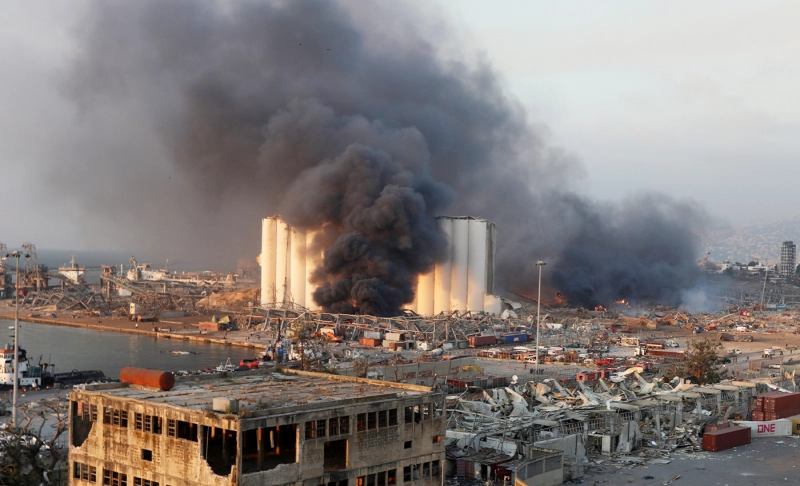By: Rohith Gutta
April 19 2023
The amount of ammonium nitrate seized in West Bengal is not ten times of what caused the 2020 Beirut explosion

The Verdict False
The quantity of ammonium nitrate that was stored at the Beirut port in Lebanon was almost 100 times the amount seized from West Bengal.
Context
A post on the social media platform Koo claims that the National Investigation Agency (NIA) seized 27,000 kilograms of ammonium nitrate from West Bengal, which was “ten times” the amount that resulted in the 2020 explosion in Beirut, Lebanon. The post, written in Hindi by a user named ‘Dev Gaur’, stated, “On 4-8-2020, there was a big explosion at a port in Beirut, 218 people died, 7,000 were injured. A few days ago in West Bengal, 27,000 kg of ammonium nitrate, 81,000 detonators, and 1,625 kg gelatine sticks were seized. After all, what is cooking in Bengal? Beirut had only 2,700 kg. The most worrying thing is that the person from whom all this has been caught is an engineer in #NIC. Which is under the Indian government (translated from Hindi).” Attached to this post was a 29 second video clip of the 2020 Beirut explosion and the subsequent impact.
However, Logically Facts found that the comparison of the quantities of ammonium nitrate found is misleading. The seizure from West Bengal is not ten times that of the amount found in Beirut.
In Fact
In August 2020, a port in Beirut exploded when tonnes of ammonium nitrate stored in a warehouse detonated after being taken off a ship. Ammonium nitrate is a combustible chemical compound used to manufacture explosives. It is also used in manufacturing fertilizers and pesticides. According to the BBC, the quantity of ammonium nitrate stored in the Beirut warehouse was over 2,700 tonnes, which is 2,700,000 kilograms.
According to Reuters, 2,754 tonnes of ammonium nitrate had arrived on a Russian-leased cargo ship in 2013 at the port and was stored there. Citing a Federal Bureau of Investigation (FBI) report dated October 7, 2020, Reuters reported that 550 tonnes of the 2,700 tonnes of ammonium nitrate exploded on August 4, 2020. The Lebanese authorities have agreed with the findings of the FBI on the quantity that exploded, the report added. So, while the quantity that was stored at the Beirut port was 2,754 tonnes, 550 tonnes of it exploded.
According to the NIA, a Special Task Force (STF) of the West Bengal police in Kolkata, in June 2022, had intercepted a four-wheeler in the state’s Birbhum area and seized 81,000 detonators from the car. This led the police to a stash of illegally stored explosives, including 27,000 kg or 27 tonnes of ammonium nitrate, as well as 1,625 kg of gelatin sticks and an unspecified number of detonators.
The NIA took over the case in September 2022 and arrested three people. The three arrested are Rintu Sheikh, Merazuddin Ali Khan, and Mir Mohammed Nuruzzaman. While Rintu was arrested in January 2023, the other two were arrested on March 31, 2023. One more person, Ashis Keora, was arrested previously by the STF Kolkata in June 2022. Further investigation by the NIA is underway, according to a press release issued by the agency on April 1, 2023. There is no report of any other seizure of ammonium nitrate in West Bengal.
According to the NIA, accused Narazzuman supplied 27,000 kg of ammonium nitrate to Sheikh. According to The Telegraph, Nuruzzaman is a software engineer at Bikash Bhavan, the office of the state government of West Bengal in Kolkata. The Times of India reports that Nuruzzaman was working on an NIC (National Informatics Centre) project at Bikash Bhavan.
The Verdict
The amount of ammonium nitrate stored at the Beirut port was over 2,700 tonnes, while the amount seized in West Bengal is 27,000 kg or 27 tonnes which is 1/100th of the amount stored in Beirut. Out of the total 2,700 tonnes, 550 tonnes had exploded in Beirut, which is over 20 times the amount that has been caught in West Bengal. Hence, we mark this claim as false.


